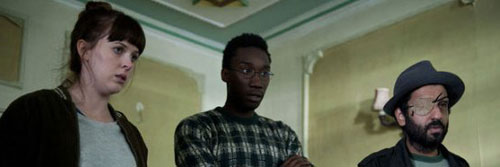
Writer/creator Dennis Kelly wove a story so minimal it provided just the barest amount of substance for all this glorious style to hang off and, based purely on the retro-set first episode of the new series, I think less may have been more. The much-vaunted cinematography and design, with some great core performances and a haunting electronic soundtrack all conspired to make it a memorable blast of colour. However, for those who prefer clear and cohesive narratives, it may be best to give it a miss.Utopia was a mixed bag, but nothing in that bag was boring. Nevertheless, for those looking for a thought-provoking night out, this production may be for you. However, given the demographic in attendance on opening night, many of whom are social justice minded, Musavi may have left his audience wanting.

It seemed primarily focused on experimenting with form to further highlight this plight to a new audience. Ultimately, Utopia failed to provide new insight into the plight of Afghans before, during, and after seeking asylum. Moreover, much of the show’s writing felt forced and on-the-nose, including one of the characters’ declarations that he is ‘just a Taliban’. The show highlighted the pitfalls of experimentation for experimentation’s sake as the transitions between the literal and surreal failed to yield a clear and compelling narrative. Utopia may be better suited to the medium of film rather than theatre and, for the most part, Musavi successfully incorporated filmed footage into the show. Read: Dance review: And the earth will swallow them whole, Perth Festival The show’s interconnected vignettes felt disjointed as the larger story was lost in his postmodernist attempt to reveal the fragility and unreliability of received meanings, identity, and memory. The show’s shortcomings are also attributable to Musavi not only having written but directed (and performed in) the show. As the show progressed, Musavi’s characters highlighted the difficulty of providing a straightforward and ‘reliable’ account of one’s life or circumstances when existential terror is a definitive aspect of one’s day-to-day lived experience.Īlthough evocative and driven by a compelling premise and desire to bring Afghan narratives to a wider, Western Australian audience, the show ultimately fell prey to the pitfalls of ‘postmodernist’ storytelling. Writer-Director, Amir Musavi, has successfully managed to capture the terror of entrapment that characterises the lives of many Afghans. The scene effectively drew attention to the plight of refugees and people living in conflict-affected countries. On the rug, the performers knelt chanting and producing the sound of gunfire.
#UTOPIA SERIES REVIEWS FULL#
Upstage centre stood a glass tank full of water. Upon our entry, we paid witness to characters trapped inside the confines of a barbed wire fence, a rug spread on the ground inside the boundary. As we waited, fellow theatregoers tried their best to mask their incredulity and to regard the monologue with the seriousness it demanded. However, while intriguing, the monologue felt unnecessary and failed to captivate the audience. She reminded us to switch off our phones. She told us of her children who had fallen prey to the vagaries of this world. A woman stood and spoke in a slow, mystifying drone, setting the scene for what was about to unfold. On opening night, a recognisably young audience lined up to take their places in the Blue Room’s intimate Kaos Room.

Nevertheless, Utopia has significant flaws despite showing great potential. It reveals the absurdities of Australia’s asylum seeker and refugee policies while poignantly highlighting Afghans’ never-ending struggle to be treated with dignity long after they have stopped staring down the barrel of a gun. Against this backdrop, Utopia – Musavi’s first Australian work – paints a surreal and haunting picture of the plight of Afghans seeking a better life. Recently, in the aftermath of the withdrawal of the United States’ troops from Afghanistan, the Australian government refused to aid Afghans who sought to flee the country following the Taliban’s successful advance on the capital, Kabul. Such is the plight of many Afghan refugees, which Utopia, an experimental play programmed as part of The Blue Room Theatre’s Summer Nights festival, explores. Instead of help, asylum seekers and refugees are too often met with accusations of swindling the Australian taxpayer and undermining social cohesion. Our country is notorious for its offshore detention – imprisonment – of those who have looked to Australia for help during moments of severe need. Successive Australian governments have generally failed to implement humane policies relating to the plight of asylum seekers and refugees.


 0 kommentar(er)
0 kommentar(er)
